In the News
Use the Type option below to filter news (media coverage) or press releases.
The news outlet links below represent many viewpoints, aggregated here for reference purposes only. The Louisiana Office of Community Development makes no claim as to the veracity or accuracy of any views contained herein.
If you are a member of the media, please contact Marvin McGraw and indicate your name, news outlet, contact information and deadline.
CONTACT
Marvin McGraw
marvin.mcgraw@la.gov
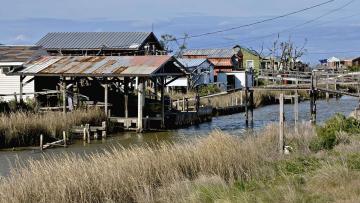
Tiny Louisiana Community Is Rapidly Vanishing Due to Rising SeasSource: HowStuffWorks Date: 05/24/2016 The people of Isle de Jean Charles have lived off the waters surrounding their small Louisiana town for nearly two centuries now. Soon the waters will take the town from them. |
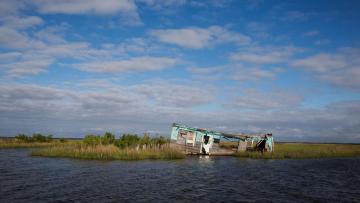
The First Official Climate Refugees in the U.S. Race Against TimeSource: National Geographic Date: 05/25/2016 A Native American tribe struggles to hold on to their culture in a Louisiana bayou while their land slips into the Gulf of Mexico. |
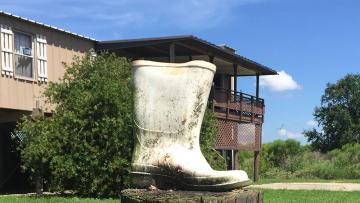
Icebergs on the Bayou, $48 million Grant reported as 1st official US climate refugeesSource: Blasting News (UK) Date: 06/02/2016 On January 21, 2016 the U.S. Department of HUD announced the winners of its $1 Billion National Disaster Resilience Competition. The State of Louisiana and The City of New Orleans combined to receive over $233 Million. |

Louisiana Climate RefugeesSource: Yale Climate Connections Date: 06/13/2016 Roch Naquin grew up with his five brothers and sisters on the Isles de Jean Charles in Louisiana. The island supported about a hundred families of the Biloxi-Chitimacha-Choctaw tribe. |
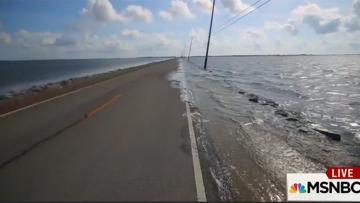
Louisiana’s Vanishing Island: America’s First Climate RefugeesSource: EcoWatch Date: 06/28/2016 Residents of a Louisiana island are among the first American climate refugees. Encroaching water is forcing them off the land they have lived on for generations. Isle de Jean Charles, Louisiana, has been inhabited by tribal communities since the Trail of Tears era. |
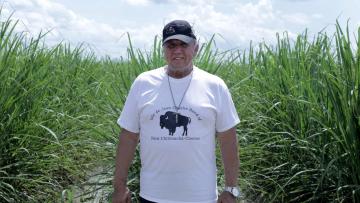
Meet the residents of Louisiana’s disappearing coastal communitiesSource: PBS NewsHour Date: 07/30/2016 Sinking land, rising seas and an increased storm surge have all contributed to coastal erosion in the bayou. Decades of construction on oil and gas canals have also played a role. |

Native community in Louisiana relocates as land washes awaySource: PBS NewsHour Date: 07/30/2016 Isle de Jean Charles in Louisiana has lost 98 percent of its land to coastal erosion caused by sinking land and exacerbated by rising seas and increased storm surges. The tribal community that lives there will be the first to receive federal tax dollars to help them relocate in response to climate change. Hari Sreenivasan reports. |
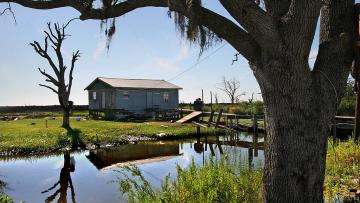
The Toughest Question in Climate Change: Who Gets Saved?Source: Bloomberg View Date: 08/29/2016 Last fall, two towns at opposite ends of the country entered a new kind of contest run by the federal government. At stake was their survival: Each is being consumed by the rising ocean, and winning money from Washington would mean the chance to move to higher ground. |

Isle De Jean Charles: Louisiana Community To Be Climate Change RefugeesSource: Sky News, UK Date: 08/30/2016 A US community is given a government grant to leave, as climate change is helping to make their homes unlivable |
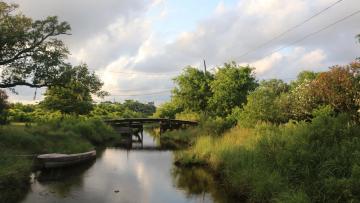
Relocating Coastal Tribe Indicates Future Challenges For LouisianaSource: WWNO Date: 09/07/2016 Sea level rise and land loss is affecting communities all over the world, not just in Louisiana. But Louisiana has one of the first communities that will be entirely resettled as a result: the Isle de Jean Charles. |
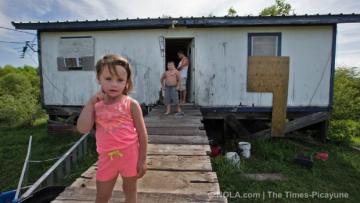
Stay or go? Isle de Jean Charles families wrestle with the seaSource: The Times-Picayune Date: 09/13/2016 The message scrawled on the whitewashed plywood sign was clear, even if it was only one man's perspective: "We are not moving off this island. If some people want to move, they can go. But leave us alone." It was signed, "Edison Jr." |
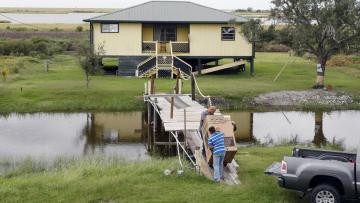
How Louisiana Is Relocating a Community Threatened by Climate ChangeSource: Curbed: Urban Planning Date: 09/29/2016 Isle de Jean Charles, Louisiana, a small coastal island in the Gulf of Mexico, is currently the site of a far-reaching experiment that may shape how the government, at every level, thinks about one of the looming issues of climate change: resettlement. |

Washed AwaySource: Full Measure Date: 10/16/2016 A small Louisiana community is part of a groundbreaking project to relocate together at taxpayer expense |
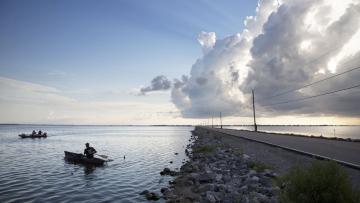
Leaving ParadiseSource: The Weather Channel Date: 11/07/2016 Thanks to a federal grant that made them the nation’s first “climate refugees,” the people of Isle de Jean Charles will be given a chance to move to higher ground, away from the rising water that threatens their two-century-old Gulf Coast community. But residents say that they only feel at home when they are near water and family... |
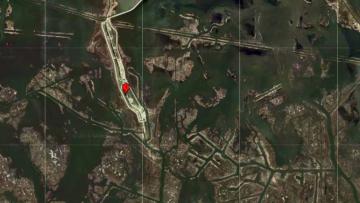
The people of Isle de Jean Charles aren't the country's first climate refugeesSource: The Lens Date: 12/06/2016 Isle de Jean Charles is endangered for the same reasons that much of coastal Louisiana has become part of the Gulf of Mexico: The land is sinking, river levees are preventing it from being replenished, oil and gas drilling accelerated erosion--and on top of that, seas are rising. |
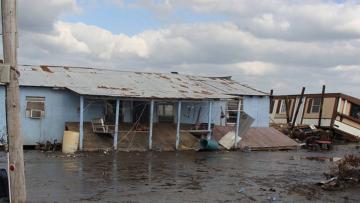
America gets its first group of climate refugeesSource: Marketplace Date: 02/01/2017 America has its political refugees and its economic refugees. And now, for the first time, it has climate refugees. |
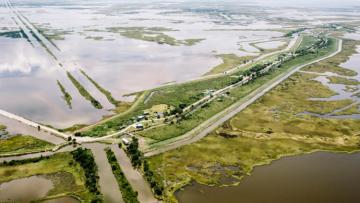
when is it time to retreat from climate change?Source: The New Yorker Date: 03/27/2017 Isle de Jean Charles, a stitch of land on the tattered southern fringe of Louisiana, is thin and getting thinner. Battered by storms and sea-level rise, and deprived of revitilizing sediment from the Mississippi River, its surface area has shrunk by ninety-eight percent since 1955, and its remaining three hundred and twenty acres can flood in... |
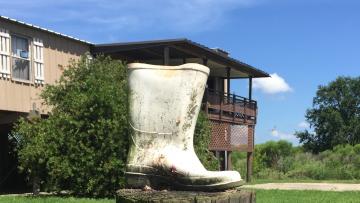
A new home: Work continues in effort to relocate island residentsSource: The Daily Comet Date: 04/08/2017 Rita Falgout grew up on Isle de Jean Charles, left and returned after 40 years. When she came back for good, she said, it looked totally different. "The island is not going to be here for much longer," she said in an interview there last week. "If I can move up, I'm going." |